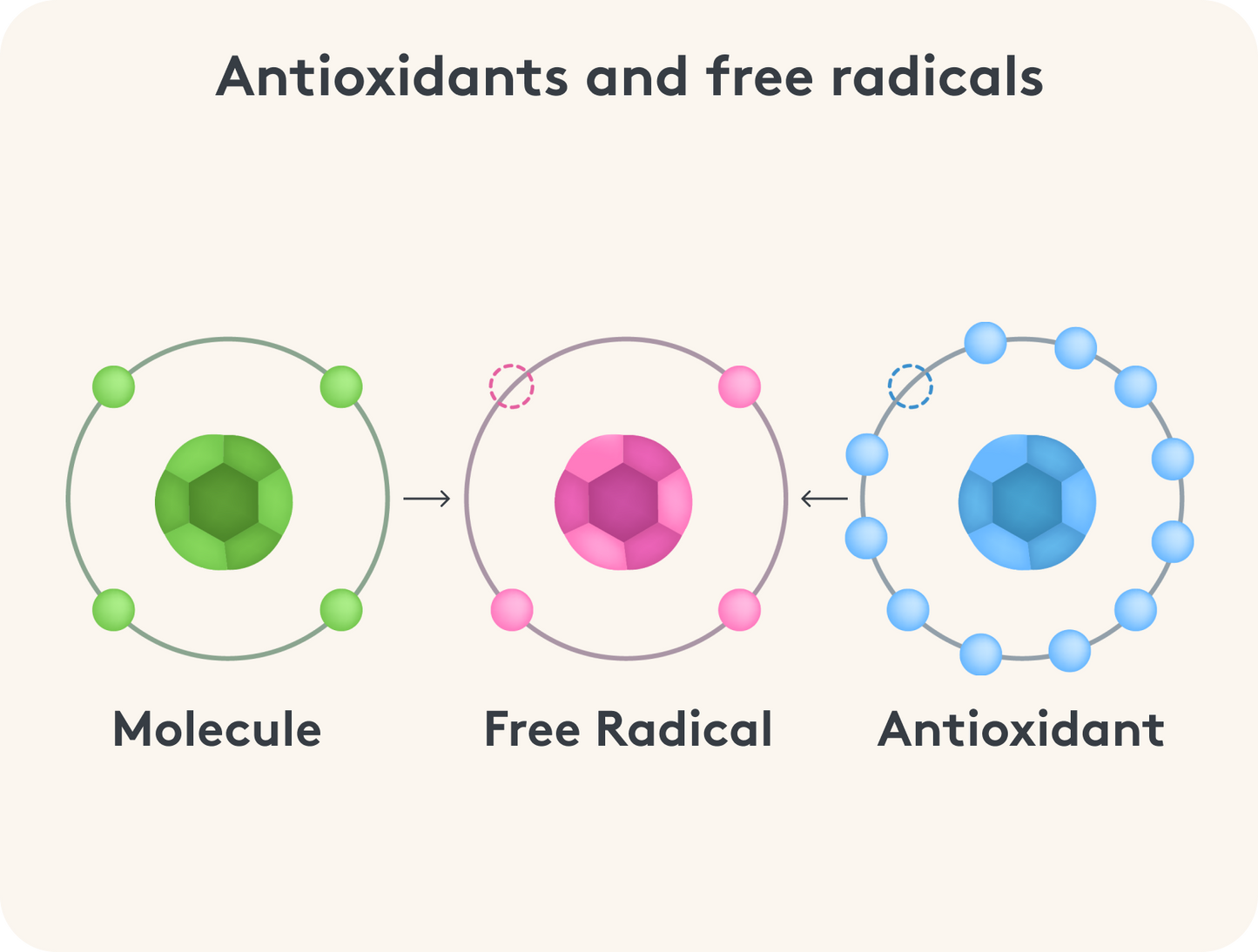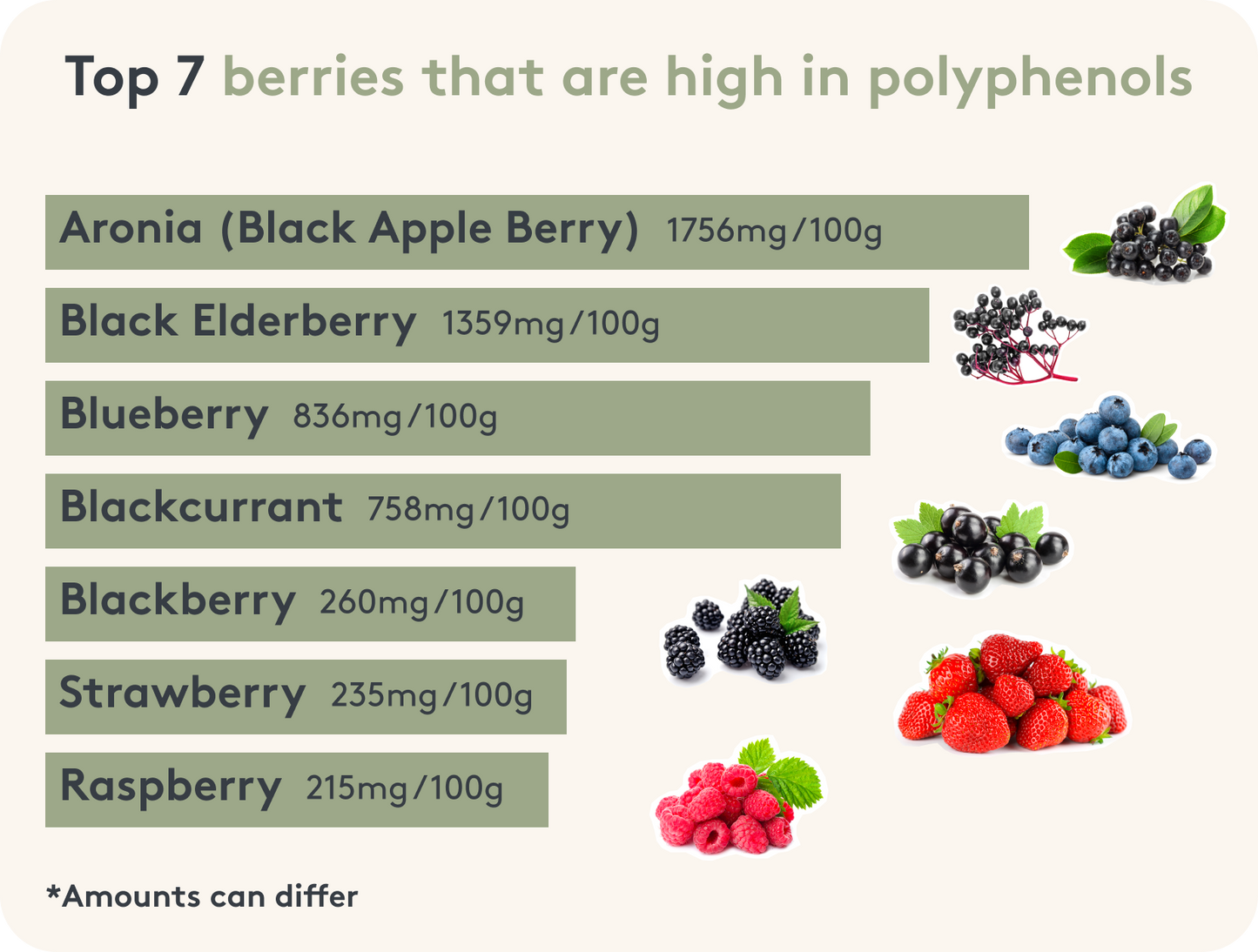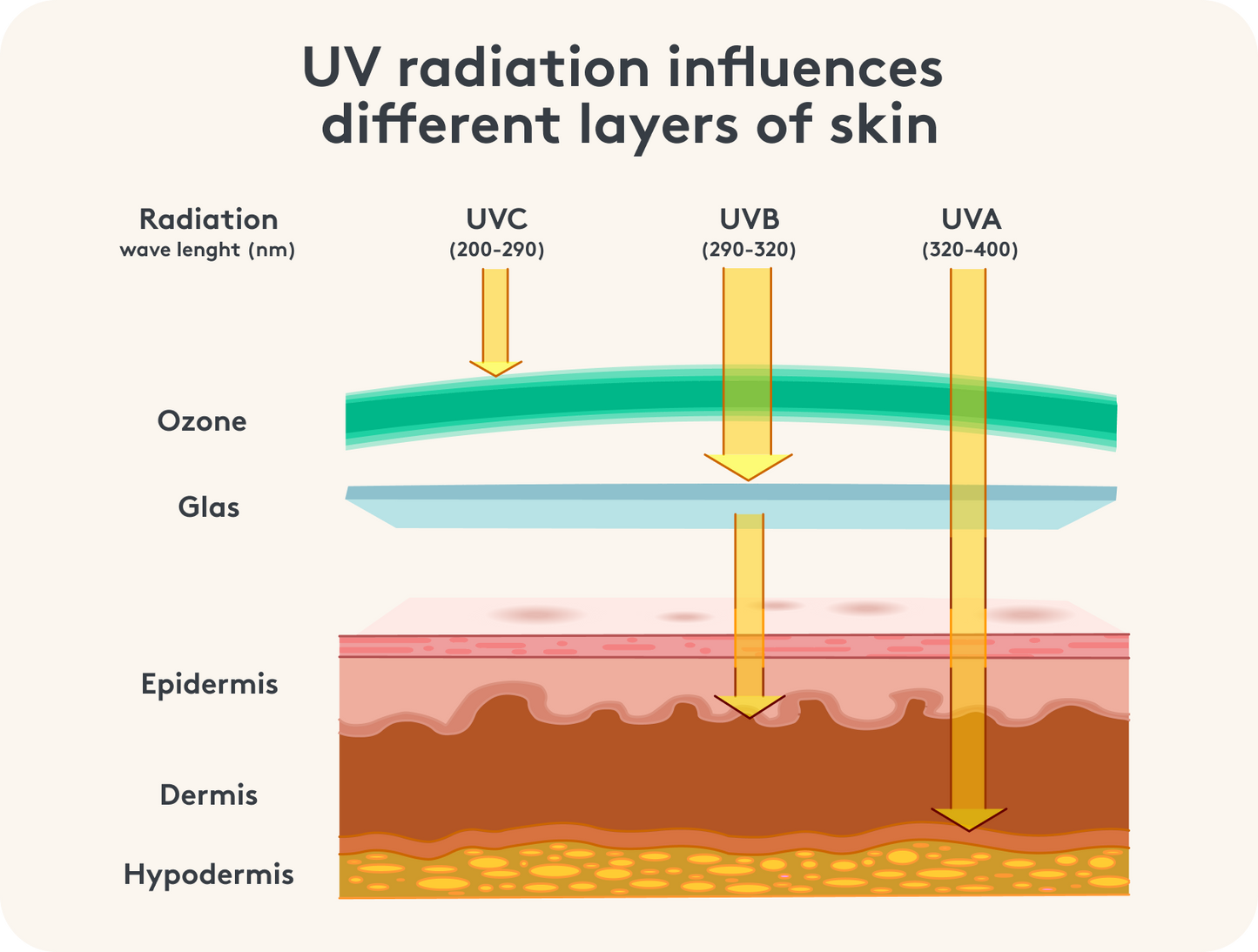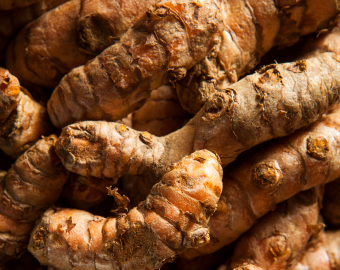Themen dieses Blogartikels:
Table of Contents
- Definition: What are antioxidants?
- How free radicals work
- How do antioxidants affect your well-being?
- Practical example: How antioxidants work
- Where does the body get antioxidants?
- Protect your body's cells with these foods
- Tip 1: Get enough vitamins and trace elements
- Tip 2: Use the benefits of secondary plant substances
- Tip 3: Eat as colorfully as possible
- Antioxidants in the form of dietary supplements
- Antioxidant as natural sun protection: Prevent skin aging from within?
- Why does solar radiation lead to premature aging?
- Fight free radicals and oxidative stress
- Sources & Bibliography
Definition: What are antioxidants?
Antioxidants are chemical compounds that occur, for example, in the form of certain vitamins, minerals, trace elements and secondary plant substances. In the human organism, they form a kind of protective system: They primarily neutralize the free radicals inside and outside your body cells and are therefore important for the health of tissue and cells.¹
How free radicals work
Free radicals are molecules that are created by metabolic processes and by harmful external influences. These include, for example,
- various environmental toxin
- alcohol and cigarettes
- the sun's UV radiation
To a certain extent, free radicals are useful: they can help the body fight viruses and pathogens and are relevant for sperm maturation. However, the radicals are aggressive and attack other cell molecules.
The reason: Due to environmental influences or your metabolism, free radicals are forced to give up an electron and urgently need a new one. They can only do this by taking an electron away from other molecules. This creates new radicals, but the previously intact molecules are no longer functional.
How do antioxidants affect your well-being?
It becomes dangerous when the number of free radicals in the body continues to increase. This process triggers “oxidative stress” . You have probably heard of this, because this stress is not only said to accelerate the aging process of the skin, but also to cause cell damage and promote the development of various diseases, for example:
- arthritis
- cancer
- arteriosclerosis
- cardiovascular diseases
To prevent free radicals from raging uncontrollably in your body and oxidative stress from endangering your well-being, you need antioxidants. They are able to "capture" and neutralize free radicals.
Practical example: How antioxidants work
The effect of antioxidants can be observed wonderfully in the kitchen. The antioxidants in lemon juice, for example, prevent a sliced apple or banana from oxidizing, i.e. turning brown.
This process is called a redox reaction. This reaction is an interplay of reduction (absorption of electrons) and oxidation (release of electrons).
Where does the body get antioxidants?
There are various sources of antioxidants. On the one hand, your body can produce these little helpers for your cells itself with the help of enzymes, hormones and metabolic products. On the other hand, antioxidants are found in food in the form of vitamins and plant substances.


With these foods you protect the cells of your body
Many micronutrients, including vitamins and trace elements, have antioxidant potential. Vitamins A, C and E, for example, are particularly helpful for the supply of antioxidants, but also trace elements such as zinc, selenium, copper and manganese.
- Vitamin C is said to have an antioxidant effect and is important when it comes to promoting the skin's own sun protection. Vitamin C is found in strawberries, cherries, pomegranates and sea buckthorn, in citrus fruits such as lemons, oranges and grapefruit, and also in vegetables such as peppers, potatoes and fennel. Vitamin C not only helps to keep free radicals under control, but it also promotes the immune system and is therefore a helpful companion in energy metabolism.
- Glutathione is one of the body's most powerful antioxidants and is made up of the three amino acids L-cysteine, glycine and L-glutamate. L-cysteine is particularly important and is the reason why glutathione can have an antioxidant effect. Fish, meat, lentils, soybeans, nuts and some types of mushrooms are particularly rich in L-cysteine.
- B vitamins, especially vitamin B2 (riboflavin), are important for energy metabolism and help reduce oxidative stress in the body. Sources include dairy products, eggs, soy, fish, whole grains, nuts, mushrooms, legumes, broccoli, kale and spinach.
- Vitamin E is one of the few fat-soluble antioxidants. This property is particularly important when it comes to overcoming cell membranes, which are largely fat-soluble. Vitamin E is mainly of plant origin and is found in seeds, nuts and vegetable oils, as well as in peppers, eggs and whole grains.
- Selenium and zinc are two minerals that are particularly important for the immune system. Selenium, for example, can help protect nerve cells from cell death. While selenium is primarily found in meat, fish and eggs, as well as in mushrooms, cabbage and onion vegetables, lentils, asparagus and nuts, you can find zinc in meat, eggs, dairy products and grains, especially whole grain products.
Good to know: Trace elements such as selenium, iron and zinc only have an antioxidant effect when they can act as components of enzymes. In order to achieve this and to provide your body with the necessary enzyme building blocks such as proteins, a balanced diet is essential.
Tip 1: Get enough vitamins and trace elements
Many micronutrients , including vitamins and trace elements, possess antioxidant potential . Vitamins A, C, and E, for example, are particularly helpful for providing antioxidants, as are trace elements such as zinc, selenium, copper, and manganese.
- Vitamin C is said to have antioxidant properties and is important, among other things, when it comes to promoting the skin's own sun protection. Vitamin C is found in strawberries, cherries, pomegranates, and sea buckthorn, as well as in citrus fruits such as lemons, oranges, and grapefruits, as well as vegetables such as peppers, potatoes, and fennel. Vitamin C not only helps control free radicals, but it also boosts the immune system and is therefore a helpful companion in energy metabolism.
- Glutathione is one of the body's most powerful antioxidants and is composed of the three amino acids L-cysteine, glycine, and L-glutamate. L-cysteine is particularly important and is the reason why glutathione can exert antioxidant effects. Fish, meat, lentils, soybeans, nuts, and some mushrooms are particularly rich in L-cysteine.
- B vitamins, especially vitamin B2 (riboflavin), are important for energy metabolism and help reduce oxidative stress in the body. Sources include dairy products, eggs, soy, fish, whole grains, nuts, mushrooms, legumes, broccoli, kale, and spinach.
- Vitamin E is one of the few fat-soluble antioxidants. This property is particularly important when it comes to crossing cell membranes, which are largely fat-soluble. Vitamin E is primarily of plant origin and is found in seeds, nuts, and vegetable oils, as well as in peppers, eggs, and whole grain products.
- Selenium and zinc are two minerals that are particularly important for the immune system. Selenium, for example, can help protect nerve cells from cell death. While selenium is primarily found in meat, fish, and eggs, as well as mushrooms, cabbage and onion vegetables, lentils, asparagus, and nuts, zinc can be found in meat, eggs, dairy products, and grains, especially whole grains.
Good to know: Trace elements such as selenium, iron, and zinc only have antioxidant effects when they can act as components of enzymes. To achieve this and provide your body with the necessary enzyme building blocks, such as proteins, a balanced diet is essential.
Tip 2: Take advantage of the benefits of secondary plant substances
In addition to vitamins, there is another important group of micronutrients: the so-called polyphenols. They are also called secondary plant substances because they are produced by plants.
Although these substances are not essential to life, they have antioxidant properties that are beneficial to you.² For example, they ensure that the leaves of plants become more impermeable to UV radiation.
Flavonoids and phenolic acids are subgroups of polyphenols and are found in fruit, vegetables and grains. Carotenoids are also secondary plant substances that the body converts into vitamin A. They are found in almost all types of fruit and vegetables and are important radical scavengers.
Tip 3: Eat as colorfully as possible
Antioxidants are found in many foods.³ The more colorful your diet, the better: The colors of the fruit and vegetables represent the different polyphenols they contain. So try to eat as varied a diet as possible and incorporate all colors. It is not for nothing that they say you should eat all the colors of the rainbow.
Plant-based foods such as vegetables and fruit, legumes, whole grain products, nuts and high-quality vegetable oils such as olive oil or rapeseed oil are particularly rich in antioxidants. Apples, blueberries, broccoli, millet, carrots, tomatoes, peppers and citrus fruits contain particularly high levels of antioxidants. But pure cocoa powder is also an antioxidant food.


Antioxidants in the form of dietary supplements
Through diet, it is possible to provide the body with sufficient amounts of minerals and trace elements to fight oxidative stress. However, if times are more stressful and you are not able to eat as balanced a diet as usual, dietary supplements can compensate for the lack of antioxidants.
Antioxidants as natural sun protection: preventing skin ageing from the inside?
Do you want to not only strengthen your body from the inside, but also keep your skin fit for a long time? Then you need antioxidants as well as sunscreen. They serve as a natural sun protection⁴ because they neutralize the free radicals that are formed and protect the cells in the skin from the sun's penetrating radiation.
Why does solar radiation lead to premature ageing?
The sun not only sends heat and light to the earth, but also UV radiation. This radiation has an effect on your skin and the cells living in it. When solar radiation hits the skin, free radicals are formed within the cells and oxidative stress occurs. The specific effect depends on the type of radiation:
The sun not only sends heat and light to the earth, but also UV radiation. This radiation has an impact on your skin and the cells living in it. When solar radiation hits the skin, free radicals are created within the cells and oxidative stress occurs. The specific effect depends on the type of radiation:
- UV-A radiation penetrates deep into the skin and can cause permanent damage. It accelerates the formation of cell-damaging free radicals and destroys the collagen fibers of the connective tissue. This causes the skin to lose firmness and promotes the formation of wrinkles. UV-A rays can also trigger sun allergies and skin cancer. They are present even on cloudy days and in autumn and winter.
- UV-B radiation only penetrates the epidermis, but is responsible for the dreaded sunburn. Every sunburn leaves permanent skin damage because it dries out the skin and changes the genetic information of the cells. This is one of the main causes of skin cancer.


Fight free radicals & oxidative stress
Antioxidants provide important protection for your cells, so you should make sure you consume them in sufficient quantities. With a balanced diet and the support of nutritional supplements, you can easily achieve this.
In addition, sleep hygiene and exercise have a positive influence on your well-being. You can find out how to optimize your night's sleep and your training plan in the MITOcare blog.
This article is based on carefully researched sources:
Sources & Bibliography
- nutritionsource.hsph.harvard.edu/antioxidants/
- ugb.de/ernaehrungsplan-praevention/sekundaere-pflanzenstoffe-bioaktive-substanzen/
- eatright.org/health/essential-nutrients/vitamins/antioxidants-protecting-healthy-cells
- Nichols, JA, & Katiyar, SK (2010). Skin photoprotection by natural polyphenols: anti-inflammatory, antioxidant and DNA repair mechanisms. Archives of dermatological research , 302 (2), 71–83.





























